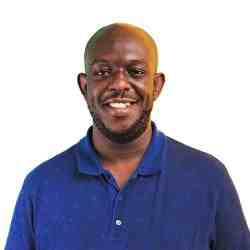Introduzione
Yordanos Eyoel is building a transnational ecosystem for learning, collaboration, and innovation to counter authoritarianism and advance inclusive and resilient democracies.
La nuova idea
Yordanos’s founding insight is that if ideas and strategies for dismantling democracies can be imported and exported, so too can strategies to strengthen democracies. And until we build transnational pro-democracy ecosystems, we will always be two steps behind anti-democratic forces, which have been on the rise on every continent over the last decade. So, she set out to build the infrastructure for a global ecosystem of democracy champions in order to secure free and open societies for all.
We are now in the 18th year of a democratic recession that shows no signs of relenting. It has swallowed several democracies and thrown others into crisis and uncertainty about their future. While the fate of U.S. democracy is inextricably linked to that of other countries around the globe, exceptionalism and an underestimation of the authoritarian threat has kept large, diverse democracies like ours from looking elsewhere for solutions and stymied efforts to defend against backsliding. While authoritarian movements have mastered cross-border learning, pro-democracy efforts tend to be siloed and under-resourced, with little effective sharing of the best strategies and successes.
Yordanos is shifting the pro-democracy ecosystem so that civil society organizations can compete with the forces that threaten self-governance. Keseb, meaning “of the people” in Geëz, an ancient South Semitic language, is a nonpartisan, nonprofit organization that Yordanos founded in 2022. Drawing practices from venture philanthropy, network building, and think tanks, Keseb supports democracy entrepreneurs and a diverse group of democracy champions to engage in the transnational exchange of solutions for shoring up liberal democracies. The aim is to accelerate what’s working, and promote the rapid exchange not just of ideas but tactics that are proving effective – for example, to counter disinformation, that undermine democratic principles like diversity – the very idea of which has become a ubiquitous wedge issue that has fueled authoritarian, ethnonationalist, and xenophobic movements in the U.S. and abroad.
With democracy at a critical inflection point, it is imperative to open the aperture of analysis beyond a single country to uncover patterns and levers to reverse democratic erosion. Keseb is quickly becoming a leading global ecosystem of people, research, ideas, and strategies to revive and build toward the promise of democracy for billions.
Il problema
Liberal democracy is under siege in the United States and around the globe. According to Freedom House, just 20 percent of the world’s population now lives in a “free” country, the smallest proportion since 1995. This marks the culmination of a persistent trend towards autocracy, with 18 consecutive years of decline in global freedom and a rise in authoritarian, ethnonationalist and xenophobic movements.
Four large laboratories of diverse democracies are at the heart of this alarming trend: Brazil, India, South Africa, and the U.S. While other democracies have also struggled against authoritarian waves in this same near two-decade span, these countries are of particular significance because they are among the largest economies in the world, represent 25% of the world’s population, and their respective national election timelines between 2022 and 2026 present far-reaching consequences for global democracy writ large.
What is fueling this slide? According to Keseb’s research, the main drivers are 1) economic change and persistent or deepening inequality, 2) rapid demographic changes, 3) dysfunctional and unregulated information ecosystems, 4) cooperation between opportunistic populist leaders and political elites, and 5) cross-border learning and solidarity by authoritarian movements and leaders. The first three conditions leave people susceptible to authoritarian narratives, and trigger what Yordanos calls the “authoritarian reflex.” But the last two add fuel to the decline and enable the direct targeting of democratic institutions. In sum, these challenges have both increased the need for and complicated the task of building inclusive democracies.
Indeed, autocrats are increasingly acting as a global force, united not by ideology or worldview, but against the common enemy of liberal democracy. Populist politicians are continually learning from successes and leveraging the “authoritarian playbook” in favor of their agendas. While authoritarians have a much easier time breaking than sustaining things, there are certain elements of their playbook that pro-democracy actors need to attend to, including: a willingness to use new tools, proactively creating strategic narratives, constantly evolving strategies and experimenting with new tactics, and perhaps most importantly, bad actors tend to be highly networked and engaged in transnational exchange of effective anti-democratic strategies. Meanwhile, the bifurcation of U.S. domestic and international pro-democracy efforts has hindered effective sharing of knowledge and tactics.
Efforts to protect and strengthen democracy suffer from four strategic gaps:
- Lack of a powerful multiracial, multiethnic, and multinational pro-democracy movement that can inspire people and counter rising nationalist authoritarianism.
- The chasm between countries as well as grassroots and “grasstops” organizations reinforces inequities across class, gender, and geography, hindering efforts to achieve transformational systemic change and build democracies that work for all.
- The inconsistent democracy funding landscape lacks consistent investment in leaders, which further compromises the sustainability of organizations and movements. For example, election-anchored philanthropic capital flow creates a “boom and bust” effect; and philanthropy support tends to be siloed – focused either domestically or globally on standalone social issues (such as gender rights). Increased funding and engagement from philanthropists is so urgently needed to prevent backsliding and promote pro-democracy innovations. In the U.S. in particular, a sense of exceptionalism and underestimation of authoritarian tactics has contributed to consistent underinvestment in innovations to defend and strengthen democracy. On the frontlines of the pro-democracy movement, along with values-based politicians and public servants, are visionary democracy entrepreneurs who are leading strategic civil society efforts. Despite these leaders and their efforts consistently demonstrating impact, Keseb’s extensive field research and interviews shows that they are ill-equipped to face the increasingly complex and volatile challenges due to underinvestment and a lack of support networks that facilitate learning and solidarity building within their countries and especially across borders (in many ways resembling the nascent social entrepreneurship field of 40 years ago). This results in high rates of burnout and exit. The pro-democracy field needs strategic, innovative, and collaborative civil society efforts -- not just a proliferation of activities -- that optimize their success in defending, strengthening and reimagining democracy, both in the short and long-term.
To combat the rise of anti-democratic forces in civil society and the general decline of democracy globally, it is no longer enough to simply expand traditional pro-democracy civil society efforts that may have worked in the 1990s. The 21st century is a time of massive societal change and technological advancement. Over the next 5-10 years in particular, innovation will be vital to the success of pro-democracy CSO’s in enabling their countries to realize the full promise and potential of truly inclusive and diverse democracies. Keseb is creating a paradigm shift within the pro-democracy ecosystem and providing democracy entrepreneurs and their organizations with a range of support, including financial and human capital, leadership development, national and transnational platforms to exchange knowledge and tactics, and peer learning and support networks.
La strategia
Yordanos's strategy is to build a global pro-democracy ecosystem for cross-country learning, collaboration, and innovation to counter authoritarianism and advance resilient democracies. With democracy at an inflection point, it is precisely the bifurcated, siloed nature of national and international pro-democracy efforts that are holding back the spread of effective ideas and tactics. Keseb is designed to pull the pieces together into a coherent field (much like Ashoka did for social entrepreneurship) and is organized to: (1) change how philanthropists think and behave, (2) create an integrated community for democracy entrepreneurs and champions, and (3) coordinate transnational exchange to bolster national and local democracy efforts. Each lever, both individually and taken together, is aimed at seeding and spreading what works.
Yordanos and her team began with a deep and clear-eyed assessment -- conducting extensive research and interviews with over 75+ civil society leaders from Brazil, India, South Africa, the U.S., and transnational efforts (read the final report: Defending and Strengthening Diverse Democracies.)
Guided by these findings, Keseb has developed a multi-pronged strategy that addresses critical gaps in the current pro-democracy ecosystem while also building towards the long-term project of a more inclusive and interconnected 21st century democracy movement. Their model is built to shift nimbly between divergent timescales: capitalizing on the urgency and attention of upcoming elections without losing sight of the longer-term build; bolstering national and transnational pro-democracy coalitions simultaneously; proactively countering disinformation while cultivating trust. Yordanos believes that democracy entrepreneurs are uniquely positioned to engage in a new approach to cross-border learning and collaboration because they already bring an open and innovative mindset to their work.
The new ecosystem model promotes cross-country collaboration, learning and innovation. Keseb’s approach isn’t a call for scale or the proliferation of new organizations (which isn’t to say there isn’t a need for innovation), but rather an emphasis on depth and spread – in other words, promoting coherence, exchange, and coordination between existing grassroots and grasstops organizations so that they collectively become more effective.
La persona
Yordanos was born during the longest civil war in Ethiopia and grew up in a family that instilled the value of political activism -- even when it required extreme personal sacrifice. Yordanos was raised by her mother, grandmother, and grandfather, who was the architect of the Ethiopian adult literacy movement. Her maternal uncle was assassinated for his political activism. When Yordanos was nine years-old, her mother, a journalist, fled to the U.S. as a political asylee. Growing up in a tumultuous Ethiopia as a multi-ethnic girl, Yordanos experienced the personal implications of politics and the consequences of civic dysfunction. While these early experiences could have easily elicited fear and apathy, they unleashed in her an unflinching commitment to the eradication of hate and disenfranchisement.
As a teenager, Yordanos moved to the U.S. to reunite with her mother. After college, she deferred graduate studies to live in Venezuela and study the student movement during Hugo Chavez’s reign. She joined student protesters who successfully contributed to the defeat of the 2008 Constitutional referendum that would have expanded Chavez’s power. Two years later, as a Women World Leaders Fellow, Yordanos brought together the Desmond Tutu Foundation and the F.W. De Klerk Foundation to host a summit for young men and women to identify local solutions to address gender-based violence.
After graduating from the Harvard Kennedy School, Yordanos joined New Profit to support visionary social entrepreneurs and their organizations across the US. Yordanos was the first person in the organization’s 22-year history to grow from Portfolio Analyst to Managing Partner. As Managing Partner, she expanded New Profit’s early-stage portfolio by 3x in 4 years, supporting ~100 early-stage organizations, 80% led by people of color. In 2019, Yordanos founded New Profit’s Civic Lab, the first nonpartisan venture philanthropy initiative in the U.S. to invest in innovative solutions building civic trust and a strong civic culture in America.
In 2016, amidst the increasing rhetoric of hate and the disturbing direction of the country, Yordanos felt she could no longer sit at the electoral sidelines and made the difficult decision to forgo her Ethiopian citizenship and become a U.S. citizen. Soon after the election, she co-founded the Sister March Network, which mobilized 4 million people around the world for the 2017 Women’s March. This pivotal experience inspired Yordanos to launch New Profit’s Civic Lab, the first venture philanthropy project in the U.S. to support early-stage democracy entrepreneurs. While engaged in that work, she realized that national solutions alone would fail to turn the tide of rising authoritarianism in the U.S. and globally. Despite robust problem-diagnoses among democracy academics and collaborators, Yordanos grew increasingly frustrated by a lack of action to promote effective transnational collaboration among pro-democracy civil society organizations. In 2022, Yordanos left her role at New Profit and set out to launch Keseb.




